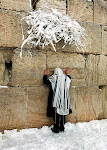11 Elul 5768
In order to fight our enemy, we have to know how he operates. A nation does not go to war without reconnaissance on the enemy. A football team does not show up on Sunday without a detailed game plan. So let's figure out how the Yetzer Hara works, and then we will be able to fight him.
The first time the Yetzer Hara appears in Chumash tells us a lot about how he operates. Let's analyze the first interaction between the Yetzer Hara and man - the Nachash's seduction of Chavah. Instead of typing up the five or six psukim, I'll ask you to grab a Chumash and follow along if you can:
The first thing the Yetzer Hara does when he's trying to get us to sin is this: He says, "Okay, what halacha are we dealing with here?" He's no fool; he knows you are a frum Jew. So he begins with something easy - what can't you do, and what is the punishment if you disobey? The Nachash asked Chavah to delineate the halachos of eating from the עץ הדעת, and she complied, listing off the issur of not eating and the punishment (death). This was her first mistake - she shouldn't even have gotten into a conversation with the Yetzer Hara. But if we do find ourselves in a conversation, in the throes of battle, we must win.
Think about an aveirah that you struggle with considerably. Got it? Good. Think about the process you go through when you commit this sin, and keep it in mind throughout the next few paragraphs. Let's see the Yetzer Hara's three strategies:
1) כפירה - We all have that little bit of כפירה inside of us. We disregard what we know from the Torah. The Yetzer Hara tries to rationalize for us right before we sin: "Oh, it's not really assur," or "That's not the real punishment," or my personal favorite, "Eh, it's only דרבנן." (Other examples of דרבנן's - Chanuka candles, Megillah, Muktzah, having a סעודה on Shabbos - we keep those, don't we?) The Yetzer Hara is very good at this tactic, and this is his first attack. We see this from where the Nachash tells Chavah "לא מות תמותון" - you aren't really going to die! Chavah had just said one pasuk earlier that the punishment for eating from the tree was death. The first thing the Nachash did was knock it down a bit - otherwise, there was no way Chavah was going to sin. Death? For a piece of fruit? I don't think so. But if the punishment is not death, then we can start talking.
2) גאוה - We all have a bit of arrogance when we're about to sin. We all think, "Who is Hashem to tell me what to do? I want to do this aveirah! I don't care that He made it assur!" This is what the Yetzer Hara is whispering to us, and this is what he said to Chavah. והייתם כאלקים יודעי טוב ורע - if you eat this fruit, you will be just like God. He made the rule not to eat this fruit, and I made the rule that allows me to eat it. We all think that we're on par with Hashem, that we can disobey His laws without giving it a second thought.
3) תאוה - Right before each sin, the Yetzer Hara shines up that aveirah real nice and somehow gives us an extra desire for it. We're not thinking about the cheeseburger until right before we're challenged not to eat it. We're not thinking about the woman (hopefully) before she walks by in a tank-top and a skirt that looks like a belt. But right before we are challenged, we all get a strong desire to sin. (Notice that if you resist the temptation, this desire to sin usually leaves soon afterwards.) The pasuk says this straight up - ותרא האשה כי טוב העץ למאכל וכי תאוה הוא לעינים. Chavah had a desire for the fruit which did not exist until she was right about to sin.
These are the three tactics the Yetzer Hara uses. Watch out for them. Know they're coming. Tomorrow we'll discuss how to counteract them.
הצלחה רבה!
Thursday, September 11, 2008
Subscribe to:
Post Comments (Atom)

No comments:
Post a Comment